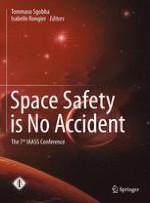2015 | OriginalPaper | Buchkapitel
Adaptation of the ISS Human Behaviour & Performance Competency Model as Observation & Debriefing Tool for Mission Control Teams During Simulations
verfasst von : Susan Buckle, Regina Peldszus, Loredana Bessone
Erschienen in: Space Safety is No Accident
Aktivieren Sie unsere intelligente Suche, um passende Fachinhalte oder Patente zu finden.
Wählen Sie Textabschnitte aus um mit Künstlicher Intelligenz passenden Patente zu finden. powered by
Markieren Sie Textabschnitte, um KI-gestützt weitere passende Inhalte zu finden. powered by
